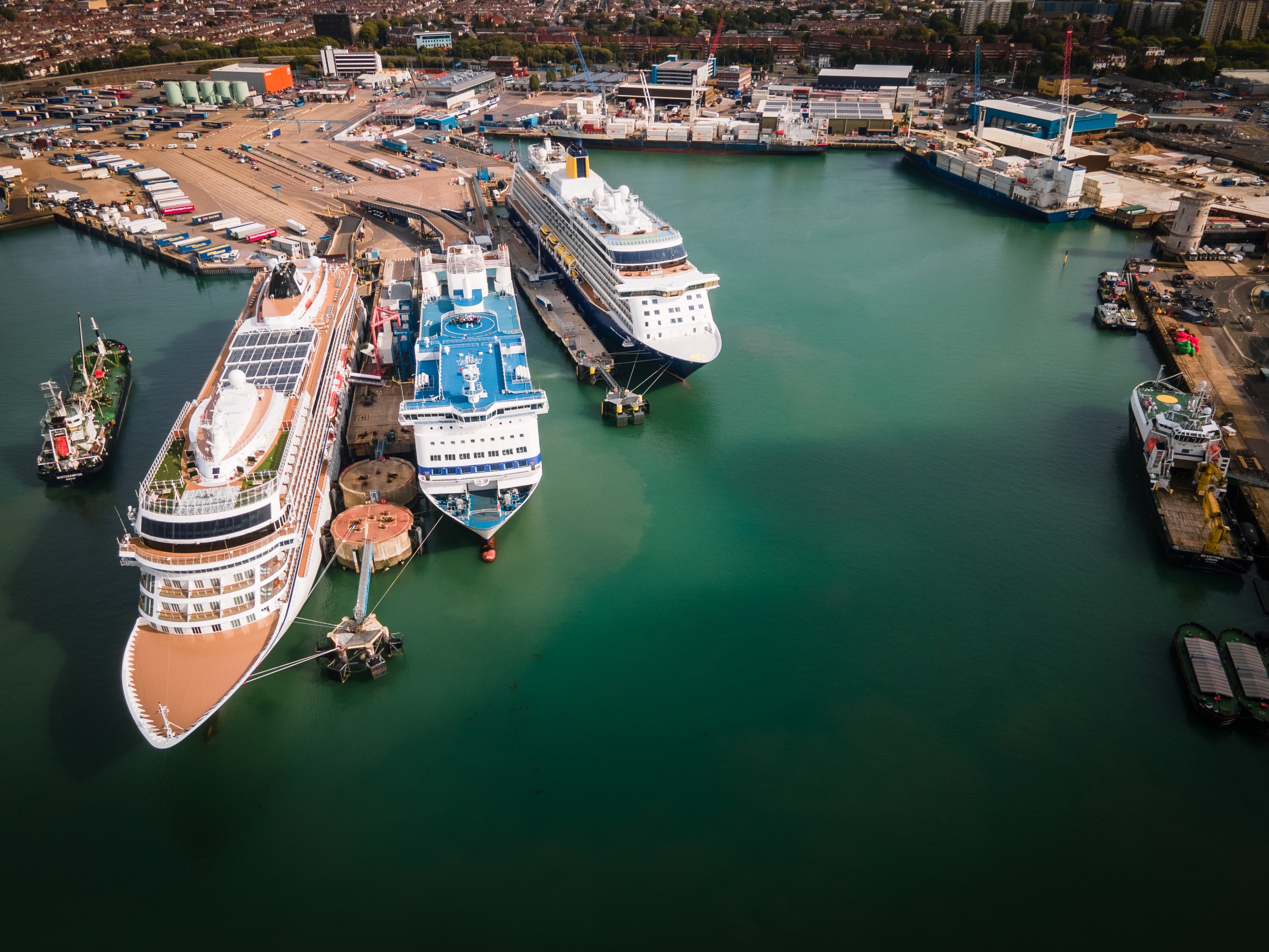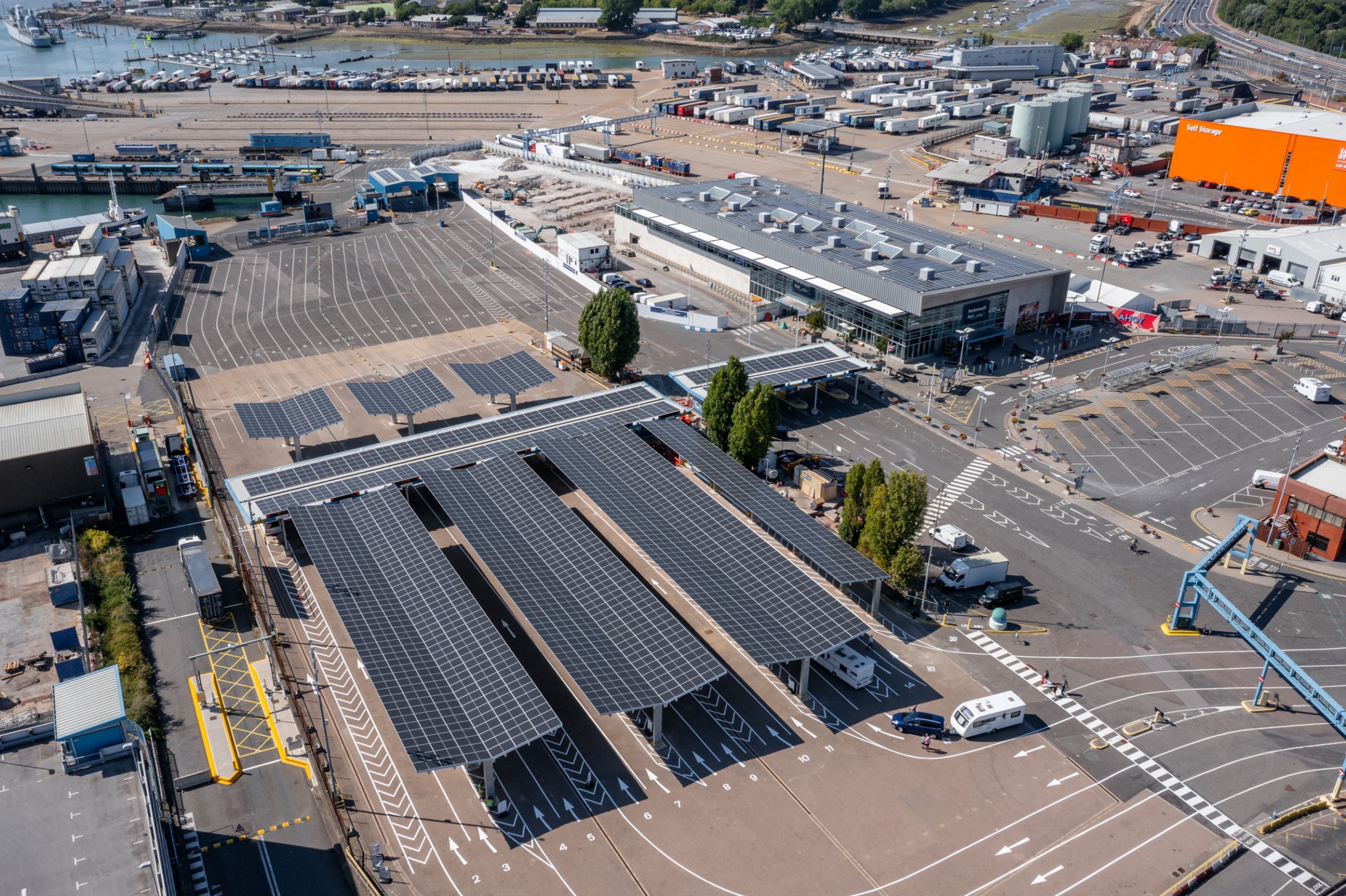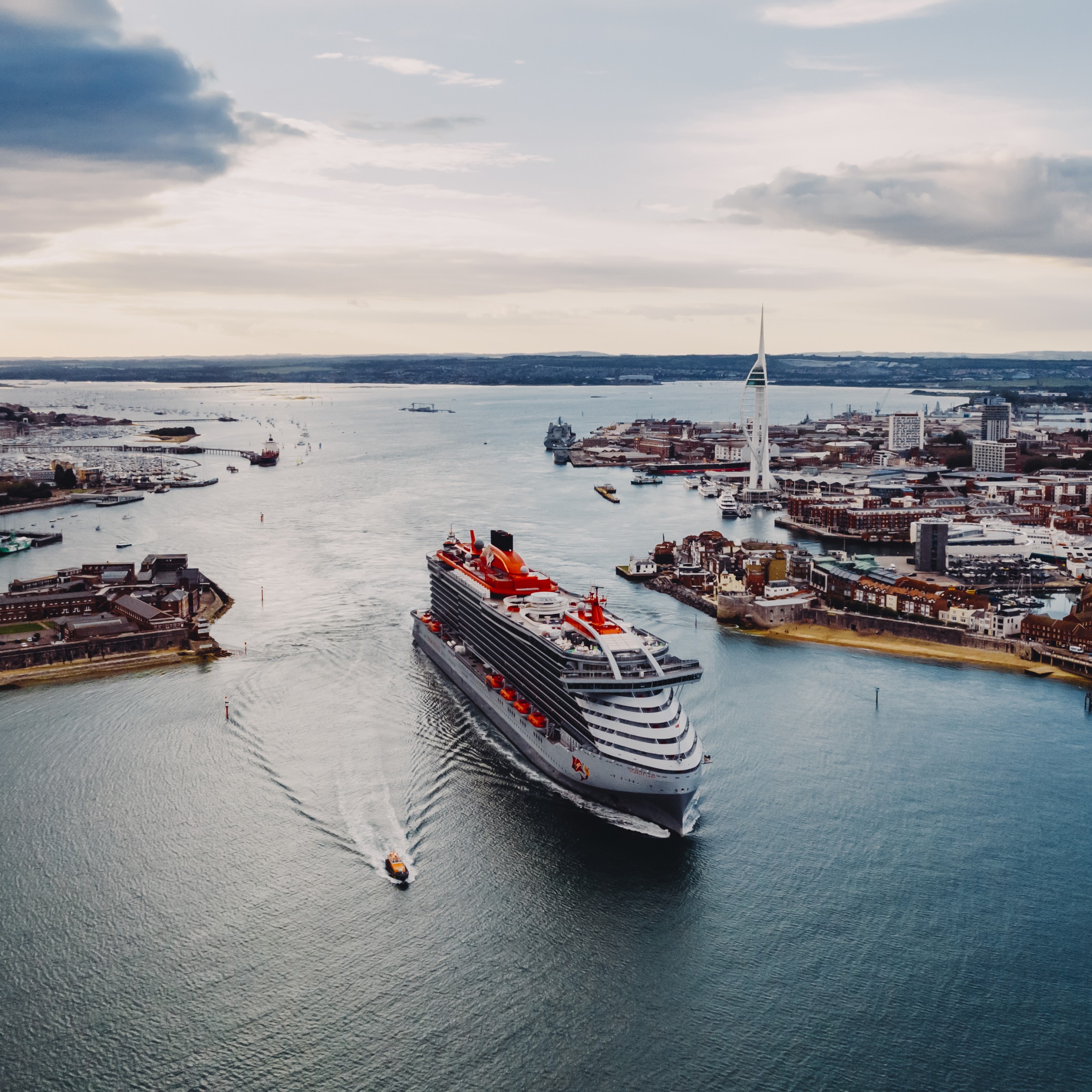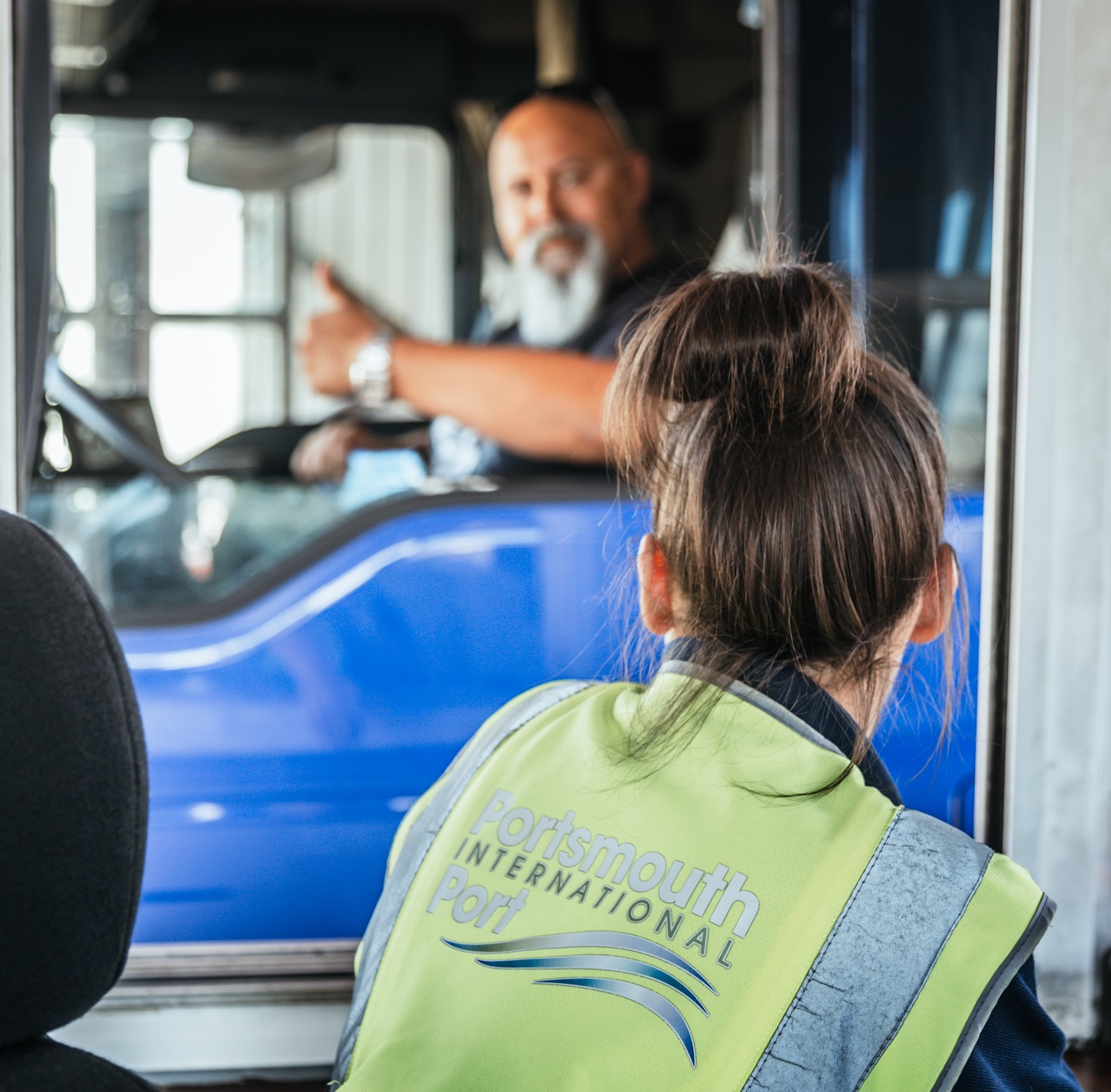28 February 2023
Our port pro of the month is Mr. Mike Sellers, Portsmouth International Port Director and Chair of the British Port Association, observer member of ESPO, in the United Kingdom. We discussed with Mike: besides learning more about his port we touched on different interesting topics such as the role of ports as energy hubs, freeports, the cruise sector, and much more.
.jpg)
Can you briefly tell us about Portsmouth International Port? What are its main characteristics and challenges?
We are the UK’s most successful municipal port, considered the best connected by providing the most routes to Europe through our long-term partnership with Brittany Ferries, and we provide a lifeline service for 95% of goods for the Channel Islands.
Portsmouth’s historic and enviable waterfront is also a significant draw for cruise ships, a significant and exciting area of growth.
Our connection to major transport routes and rich maritime heritage, makes the city itself an ideal place for marine related business. Our statutory harbour authority control also looks after one of the busiest stretches of water, with over nine million passengers relying on the port’s operations to travel abroad and for domestic ferry services.
However, to grow we need more space and that’s our main challenge, to keep up with the pace of demand and accommodate.
You just launched a masterplan in 2022 until 2042. What are the main ambitions, pillars of this masterplan? How will your port look like in twenty years? Is this still possible to define a strategy so far ahead given the rapidly changing world and economy?
Anything can happen in 20 years, and as we have recently seen anything can happen within a few weeks, however standing still and waiting for normal service to resume is not an option. The uncertain events we have all faced while daunting present opportunity and clarity over what is important.
Our Masterplan focus made us realise that sustainability is at the core of the port’s future, from that central focus you build around the ideas how to achieve that ambition.
Home to one of the oldest ports in the UK we are proud of being one of the most innovative.

Portsmouth International Port now hosts a Freeport zone. Could you explain the features of the Freeport zone in Solent? What is the importance of this zone for the port? Do you see it as a real game changer?
Establishing a freeport in the Solent is a key component of the Solent 2050 long-term economic strategy. It will unlock billions of pounds’ worth of investment, create tens of thousands of new jobs and play a critical role in achieving national levelling up ambitions.
As the UK’s best-connected port, supported by our international cargo operation Portico, we are able to provide the facilities for a customs site, enabling businesses to benefit from opportunities to bring their goods to and from the UK.
We are near the city’s tax site at Dunsbury, and also linked to our neighbouring Freeport partners in the Solent region. There is a real opportunity to provide long term economic prosperity for both businesses and their employees, and both the city and the port are playing an essential role unlocking these opportunities.
The cruise business is a core activity of Portsmouth International Port. How do you see this business evolving in the coming years? Has passenger traffic picked up again after the COVID-19 crisis? How do you work together with the city of Portsmouth?
Remarkably despite the challenges of the pandemic, cruise has gone from strength to strength. Virgin Voyages launched their first ever sailings from Portsmouth. We have had a record number of maiden calls, and this year on track for our busiest season to date, with 100 calls scheduled. Not to mention the opening of our brand new, carbon neutral terminal extension in the summer, which will help us manage an additional 250,000 passengers a year.
We are becoming the choice for small to medium, boutique, luxury lines, looking to offer their passengers a high-end experience that starts at the port.
The United Kingdom’s port landscape is dominated by ports that are in private ownership. The port of Portsmouth is however owned by the City Council. What are the advantages of being a publicly-owned company?
Our mantra has long been, the port’s success is the city’s success and everyone who works here is proud of the significant contribution the port makes to the council’s budget to help provide essential services that helps the city thrive.
It also means that we are more like a family-owned company and we grow the business by working with those who share our values for an efficient, expert, premium service and experience. Coming from the private sector myself there is no doubt challenges in merging both commercial interests and what is required to finance them through a public sector model, but taking a look where we are now, what we have achieved and the ambitions we have are no different to our main competitors.
We get to work closely with a range of colleagues, forming part of major regeneration of Portsmouth.

In ESPO we very much try to explain the role of ports as hubs of energy, more in particular when it comes to the energies of the future. Do you see a role for the port of Portsmouth in that respect? What will be the main challenge?
As you describe ports are the hubs of energy, and universities and experimental businesses are the ones exploring all the innovative solutions, which is why we have partnered with a number of universities and innovators to help support some ground breaking projects. These include:
- Artificial Intelligence/machine learning controlled lithium/lead storage battery;
- A 1MW lithium-ion battery energy storage systems (BESS) for storing renewable energy from the solar arrays;
- A 35kW Hydrogen Electrolyser Pilot in collaboration with the University of Portsmouth, fully funded under the Clean Maritime Demonstration Call;
- A virtual ‘Digital Twin’ of the port to investigate energy management potential for visiting ships fully funded by the Clean Maritime Demonstration Call, and in collaboration with the University of Portsmouth;
- An application to Innovate UK for a 1MW Flow-Battery prototype, barge mounted, as a scalable solution to the lack of UK infrastructure to supply through the grid.
The challenge is the scope and scale of options, it is exciting to be a part of pioneering environmental opportunities.
The greening of a port is a task which requires the help of all port stakeholders. What can a port authority do to engage all stakeholders in making their operations more sustainable?
We made our commitment to sustainability very clear; it is about real outcomes not just plastering platitudes, but we appreciate that our stakeholders need support. So if we say we expect cleaner ships, then we need to provide the infrastructure for that to happen. If we are serious about being net carbon neutral by 2030, then we need to show a clear roadmap of how we are going to get there.
It is about providing with solutions, and most importantly everybody has a responsibility to consider how they can be more sustainable. It is not a nice-to-have anymore, it is an expectation. It will also start to define how companies operate, so for brands that want to be forward thinking and meet customer expectations they need to be thinking about how their operations will be viewed in the future.
The port of Portsmouth is aiming to deploy onshore power supply (OPS) for some of the ship types calling at the port. How many quays will be equipped with OPS? Which ships will be able to connect to it? How will this be financed, and what stakeholders are involved in contributing to the deployment of OPS?
We are officially on track to become the UK’s leading shore power port, after managing to secure extra power supply to the port. In under two years we will be able to support multiple ships that have capacity to plug-in when they are alongside the berth, reducing harmful emissions from running engines along with meeting net carbon neutral ambitions ahead of Portsmouth City Council’s and the government’s 2030 target.
Installation could be completed by 2025, in time for our major customer Brittany Ferries, who has two new hybrid ships which will operate from Portsmouth the same year, with the remaining fleet being converted to shore power by early 2027. However, despite the port committing £3 million to secure the power, there remains a challenging financial case to invest in the port infrastructure without some grant funding support.
We are also expecting a minimum of 100 shore power ready cruise calls by 2026, and by 2030 there is an expectation from industry trade body CLIA all cruise vessels will need to be shore power compliant.

Since 2020, the United Kingdom is no longer member of the European Union. How has the connectivity with the EU and more in general changed your business?
As a just-in-time ro-ro operation we just look for reassurance that goods can continue to move freely. We are not a large port because goods do not hang around for long, and efficient movement was the priority. However, we are seeing a rise in unaccompanied freight coming through, which puts extra pressure on making sure we have space.
Most critically is getting a steer on the new Target Operating Model, on how plants and products of animal origin are handled. The council has spent millions on a bespoke facility, which is no longer required and we need to know how to recoup costs.
How did you get into maritime transport? How did your career path lead to this position?
I come from a family of port workers; you could say it’s in my DNA! I have been in the ports industry for nearly 30 years, holding a range of operational and commercial managerial roles across the UK. I have been Portsmouth International Port’s director and a shareholder director for its subsidiary Portico Shipping for the last six years.
I am also currently chair of the trade body British Ports Association (BPA), which has long been an important voice for the industry, especially in the last few years. To be the chair of the BPA, nominated by my peers, is a huge honour, representing the industry I love.

Related documents
No attachments.
